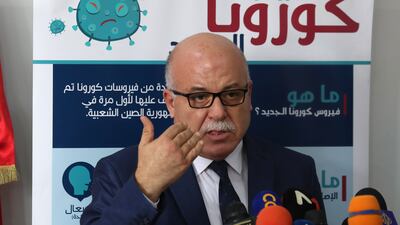Tunisian President Kais Saied has denied he staged a coup by sacking the country's prime minister and suspending Parliament, as the country's biggest party urged dialogue.
In a video posted by the president's office on Facebook late on Monday, Mr Saied said those who describe his latest decisions as a coup need to “revise your constitutional lessons”.
He said his actions were supported by Article 80 of Tunisia's constitution, which says the president may take special action “in a state of imminent danger threatening the integrity of the country and the country’s security and independence” in consultation with the prime minister and speaker of Parliament.
While Mr Saied has a background in constitutional law, experts disagree over his interpretation of Article 80.
Parliament has been suspended for 30 days.
Tunisia's main civil society groups including the powerful labour union on Tuesday warned Mr Saied not to extend the extraordinary measures he announced on Sunday beyond a month.
In a statement the groups, which also included the journalists' and lawyers' syndicates and the human rights league, called on Mr Saied to lay out "a participatory roadmap" for the crisis
Mr Saied called on Tunisians to remain calm and not respond to any provocations asking them to take to the streets, saying “the most danger a nation can face is internal explosion".
On Monday afternoon, the presidency announced the dismissals of Defence Minister Ibrahim Bartaji and acting Justice Minister Hasna Ben Slimane.
Tunisia's biggest party, the Islamist Ennahda, also urged calm on Tuesday, issuing instructions to its supporters through party branches not to resume a sit-in outside parliament and to avoid protests, in a reversal of an earlier call by its leader Rached Ghannouchi to take to the streets.
Though some senior party members wanted to retain a street presence, its leaders decided to avoid any further escalation and allow a period of calm, two Ennahda officials said earlier on Tuesday.
Clashes broke out outside the army-barricaded parliament on Monday between supporters of the president and those opposed to the move and soldiers blockaded the assembly in Tunis while Mr Saied backers hurled stones, bottles and insults at supporters of the Islamist-inspired Ennahda, whose leader was barred entry to the complex.
But the demonstrations died down later in the day and the area outside parliament remained empty on Tuesday after the presidency extended an overnight curfew in place to combat the coronavirus and banned gatherings of more than three people until August 27.
Prime Minister Hichem Mechichi, who is at his home and not under arrest, a source close to him told Reuters, said he would not be a "disruptive element" and was ready to hand over power to whomever Mr Saied appointed.
The president, who has not said when he will appoint a new prime minister or relinquish emergency powers, has also ordered that state administrations and foreign institutions stop work for two days.
Ennahda called Mr Saied's move "a coup d'etat against the revolution and against the constitution." It warned that its followers "will defend the revolution". Later the party called for dialogue to resolve the crisis.
The powerful Tunisian General Labour Union, which played a key role in the 2011 uprising, has said it is open to facilitating dialogue and that the current situation must be temporary.
The union also called on the president to give guarantees that he is not seeking a wider power grab and that all actions are in accordance with the constitution.
The crisis follows months of deadlock between the president, Mr Mechichi and Mr Ghannouchi, who is also the parliament Speaker. This has crippled the Covid-19 response, as deaths have surged to one of the world's highest per capita rates.
More than 18,000 people have died of coronavirus in a nation of 12 million.
How the world responded
The US said it was too early to label the action a coup and called on the birthplace of the Arab uprisings not to "squander its democratic gains".
Secretary of State Antony Blinken said he "encouraged President Saied to adhere to the principles of democracy".
State Department spokesman Ned Price said the US had urged all parties to avoid escalations that could lead to violence.
"We are particularly troubled by reports that media offices have been closed and urge scrupulous respect for freedom of expression and other civil rights," Mr Price said.
In a phone call with the Tunisian foreign minister, Arab League chief Ahmed Aboul Gheit expressed “complete support for the Tunisian people".
A statement said the Cairo-based league hoped Tunisia would “move swiftly past the current turbulent phase in restoring stability".
A Tunisian political source told Reuters that neighbouring Algeria had pushed both Mr Saied and his opponents to step back from any confrontation to avoid further destabilisation or the intervention of any external forces.
The UN urged all parties to work towards solving the crisis.
“We call on all stakeholders to exercise restraint, refrain from violence and ensure that the situation remains calm,” UN spokesman Farhan Haq told reporters on Monday. “All disputes and disagreements should be resolved through dialogue.”
Both Saudi Arabia and Kuwait held phone calls with Tunisia's foreign minister on Monday.
Saudi Foreign Minister Prince Faisal bin Farhan “stressed the kingdom's keenness on the security and stability of Tunisia and supports everything that would achieve this,” the Saudi state news agency reported.
Despite the removal of dictator Zine El Abidine Ben Ali in 2011 and a transition to democracy, Tunisia has failed to recover economically or politically.
Covid-19 has driven the country of 11.5 million further into financial distress, as the mainstay of the economy, tourism, has faltered under worldwide lockdowns. Tunisia saw its economy contract by eight per cent last year.











